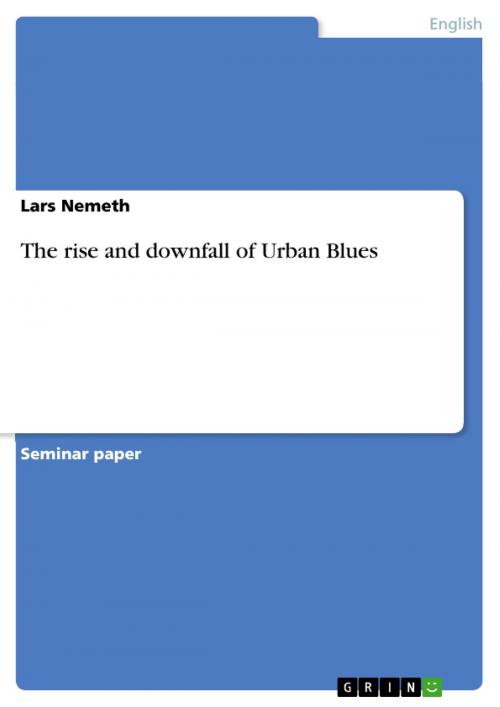| Author: | Lars Nemeth | ISBN: | 9783638466301 |
| Publisher: | GRIN Publishing | Publication: | February 7, 2006 |
| Imprint: | GRIN Publishing | Language: | English |
| Author: | Lars Nemeth |
| ISBN: | 9783638466301 |
| Publisher: | GRIN Publishing |
| Publication: | February 7, 2006 |
| Imprint: | GRIN Publishing |
| Language: | English |
Seminar paper from the year 2005 in the subject American Studies - Culture and Applied Geography, grade: 2, Carl von Ossietzky University of Oldenburg (Anglistik), course: The Afro - American Blues, 12 entries in the bibliography, language: English, abstract: The Urban Blues is a form of blues music that developed in the big cities in the U.S.. The one city that dominated this development is Chicago. That is why, often the Chicago Blues is meant when talking about Urban Blues. There is probably no other blues style with such a high quality of recognition considering form, feeling and sound like the Chicago Blues. It is based on the rough and direct Delta Blues which came in contact with urban life. Besides, Urban Blues is the first blues style that reached a mass audience. Not just in the bigger cities of the U.S. but also worldwide. One of the most popular musicians of those days is a man called Muddy Waters. He helped to transform a style and technique which guided bluesmusic into a new dimension. He adopted the rural delta blues sound and combined with the feeling of the new living conditions of the Afro Americans. But the urban blues became more popular, left the black quarters and ghettos and was absorbed by the mainstream very soon. Urban blues, released from the subcultural status, a white mass audience and economy started to control the buisness. In the mid fifties the blues hybrid Rock`n Roll took over public attention and Blues and Rock `n Roll were delivered from the Afro American identity. At the end of this development there was a huge lack of authenticity for 'black' audience although it once was the Afro-American culture through which they expressed themselves. Consequently most parts of the afro american audience disappeared and started searching for a new musical home. I will try to work out the development from the Urban Blues as an Afro-American identification and its rise until the downfall and alienation for the 'black' audience. I will proof this development by the example of the live and career of Muddy Waters and his record company Chess. His roots in the Mississippi Delta Blues, his reputation as one of the heads in Urban Chicago Blues and how he lost his native base and audience. Why did the Afro-Americans turn away from the blues? Why did they leave their cultural roots and where did they arrive, where did the Afro-American culture find their new home? First of all I will concentrate on the demographic, social and cultural changes the Afro American population caused to move in the big cities and how their life and living conditions changed. There were three social changes taking place in the first half of the twentieth century that led to urban blues.
Seminar paper from the year 2005 in the subject American Studies - Culture and Applied Geography, grade: 2, Carl von Ossietzky University of Oldenburg (Anglistik), course: The Afro - American Blues, 12 entries in the bibliography, language: English, abstract: The Urban Blues is a form of blues music that developed in the big cities in the U.S.. The one city that dominated this development is Chicago. That is why, often the Chicago Blues is meant when talking about Urban Blues. There is probably no other blues style with such a high quality of recognition considering form, feeling and sound like the Chicago Blues. It is based on the rough and direct Delta Blues which came in contact with urban life. Besides, Urban Blues is the first blues style that reached a mass audience. Not just in the bigger cities of the U.S. but also worldwide. One of the most popular musicians of those days is a man called Muddy Waters. He helped to transform a style and technique which guided bluesmusic into a new dimension. He adopted the rural delta blues sound and combined with the feeling of the new living conditions of the Afro Americans. But the urban blues became more popular, left the black quarters and ghettos and was absorbed by the mainstream very soon. Urban blues, released from the subcultural status, a white mass audience and economy started to control the buisness. In the mid fifties the blues hybrid Rock`n Roll took over public attention and Blues and Rock `n Roll were delivered from the Afro American identity. At the end of this development there was a huge lack of authenticity for 'black' audience although it once was the Afro-American culture through which they expressed themselves. Consequently most parts of the afro american audience disappeared and started searching for a new musical home. I will try to work out the development from the Urban Blues as an Afro-American identification and its rise until the downfall and alienation for the 'black' audience. I will proof this development by the example of the live and career of Muddy Waters and his record company Chess. His roots in the Mississippi Delta Blues, his reputation as one of the heads in Urban Chicago Blues and how he lost his native base and audience. Why did the Afro-Americans turn away from the blues? Why did they leave their cultural roots and where did they arrive, where did the Afro-American culture find their new home? First of all I will concentrate on the demographic, social and cultural changes the Afro American population caused to move in the big cities and how their life and living conditions changed. There were three social changes taking place in the first half of the twentieth century that led to urban blues.















